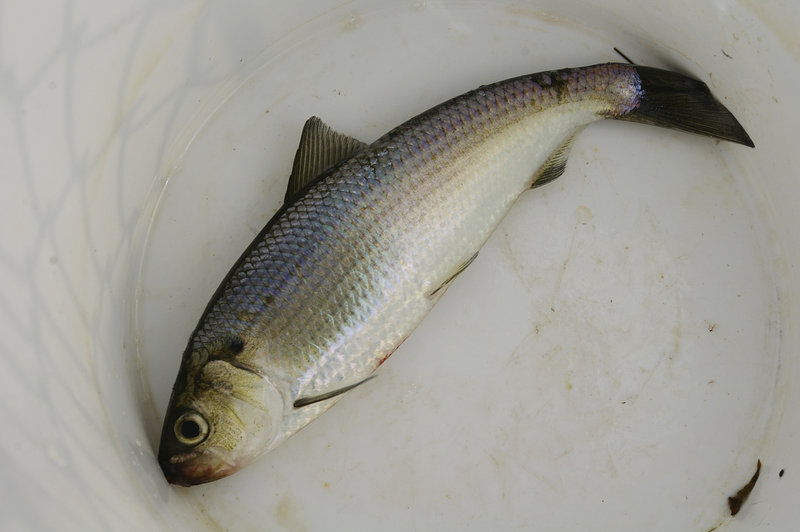An environmental group has sued the state of Maine, opening a new round in the fight over the future of alewives in the St. Croix River, which separates Washington County from New Brunswick.
The federal lawsuit filed Monday by the Conservation Law Foundation follows legal sparring this summer between the U.S. Environmental Protection Agency and Maine Attorney General William Schneider over a state law that ordered the fish passages at the Grand Falls dam in Woodland closed to the alewives’ spring spawning run.
In July, the EPA informed Schneider that the law violates provisions of the federal Clean Water Act and directed the state to open the fishways.
After consulting with Gov. Paul LePage, Schneider responded in August that the EPA’s directive was irrelevant because the intention of the state law is to manage fish, not water quality.
The EPA, LePage and Schneider have said nothing publicly on the issue since then.
Sean Mahoney, director of the Conservation Law Foundation’s Maine office, said he hopes the lawsuit will resolve the impasse in favor of the fish.
It argues that the state’s position puts it in conflict with the U.S. Constitution, which says federal law trumps state law when the two are in conflict.
“This state law has the specific intent of preventing alewives from reaching their native habitat, and the Clean Water Act has the specific intent of restoring native fish like alewives to their natural habitat,” Mahoney said.
The Attorney General’s Office had no comment on the development Monday.
The lawsuit names two administration officials, Marine Resources Commissioner Patrick Keliher and Inland Fisheries and Wildlife Commissioner Chandler Woodcock, as defendants.
If the past is any guide, the court will likely receive a response from the state and then rule in the coming months.
Alewives will likely begin their spawning run in late April.
Maine’s 1995 and 2007 alewives laws were passed at the behest of smallmouth-bass fishing guides, who fear that spawning alewives would harm bass populations.
The 2007 law was opposed by environmentalists, fishermen, lobstermen and the government of Canada.
They argued that if alewife populations were restored, the fish would provide bait for fishermen and food for cod and other commercial fish species.
Before the passage of the 1995 law, 2.6 million alewives spawned in the St. Croix each year.
After the state Legislature ordered the Grand Falls and Woodland dam fishways closed, the spawning population fell to 900 fish.
The EPA took up the issue in response to a lawsuit that the Conservation Law Foundation filed in May, claiming the federal agency failed to enforce the act.
The EPA issued its directive to Attorney General Schneider the day after the Maine Sunday Telegram published an article on the 17-year battle over the alewives’ access to the river.
In his response to the EPA, Schneider said LePage was committed to a compromise plan developed by the International Joint Commission, a U.S.-Canadian body that resolves disputes on the international waterway.
Under the plan, a limited number of alewives would be allowed to spawn above Grand Falls. But if the plan is to be enacted, the Legislature will have to change the existing law.
Mahoney said the compromise plan is a farce, based on the notion that spawning alewives will somehow harm smallmouth bass populations in the watershed, for which there is no scientific evidence. Most studies suggest alewives boost smallmouth bass populations.
“This plan isn’t a compromise, it essentially is the hostage to the irrational prejudices of people who have an economic interest in maintaining the smallmouth bass,” he said.
The Passamaquoddies – natives of the watershed – strongly support full restoration of the alewives to the river.
On Sept. 27, their joint tribal council unanimously passed a resolution praising the EPA’s directive and demanding that the state open the fishways.
“I won’t rest until I see the alewives swim to their ancestral spawning grounds unimpeded,” said Brian Altvater, a founder of Schoodic Riverkeepers, a Passamaquoddy-founded group that’s active on the issue.
If the court sides with the Conservation Law Foundation, Mahoney said, it will compel the state to allow the alewives unimpeded access past the Grand Falls dam.
It would not have any bearing on the fishways at the next set of dams, at Vanceboro (on the river’s east branch) and Grand Lake Stream (on the west), which were built after passage of the Federal Power Act so have never been in Maine’s jurisdiction.
Staff Writer Colin Woodard can be contacted at 791-6317 or at:
cwoodard@pressherald.com
Send questions/comments to the editors.


